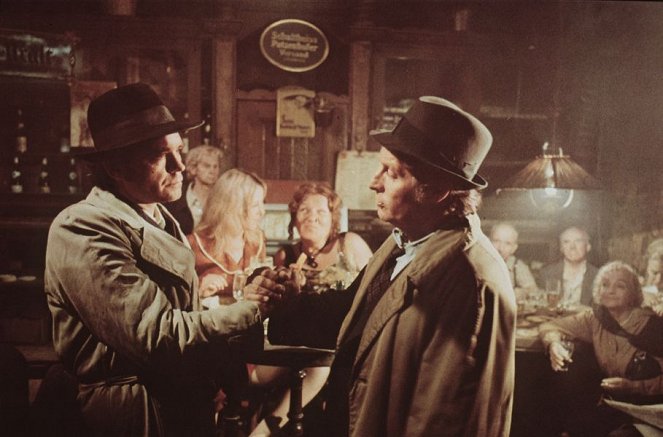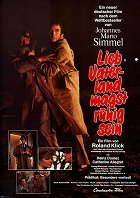Director:
Roland KlickGuión:
Roland KlickCámara:
Jost VacanoMúsica:
Jürgen KnieperReparto:
Heinz Domez, Catherine Allégret, Georg Marischka, Thomas Danneberg, Gunter Berger, Rolf Zacher, Barbara Morawiecz, Hans Helmut Müller, Peter Schlesinger (más)Sinopsis(1)
This breathtaking thriller set in 1960s Berlin, divided by a wall, brings a minutely composed genre spectacle, inhabited by agents and gangsters, while taking the viewers to the chaotic time of corrupt values and absurd motivations symbolised by the monstrous construction that cut through the German capital. (Summer Film School)
Reseñas (2)
Roland Klick elige un tema interesante, pero desgraciadamente se queda corto en la narración. Es bastante difícil entender lo que ocurre en la película, quién es qué personaje, quién está planeando qué, y especialmente una cosa bastante crucial: si una escena concreta tiene lugar en Berlín Oriental o Occidental (normalmente lo averiguas después). Todo esto dificulta el seguimiento de la trama por parte del público y hasta cierto punto puede molestarle. Klick tuvo mucho más éxito con sus piezas originales (Little Vampire, Supermarket...); no debió haber adaptado a Simmel. [EPA 2018]
()
The year is 1964. The Berlin Wall has been standing for three years and one of its direct consequences is a thriving organised trade involving the illegal transport of people across the border. The old-school thief Bruno is ordered by the East German Stasi to infiltrate West Berlin and kidnap the head of the smuggling organisation. However, Bruno decides to play a double game, thanks to which he finds himself between the grindstones of the secret services on both sides of the Iron Curtain. Dear Fatherland Be at Peace is the first and, as it happened, last entry in Roland Klick’s filmography that was made as a commercial genre commission and was supposed to be the beginning of Klick’s collaboration with producer Bernd Eichinger, who wanted to make ambitious commercial projects that would restore German cinema to its former glory and the international renown that it had enjoyed in the 1920s. Eichinger eventually succeeded, producing films such as The NeverEnding Story (1984), The Name of the Rose (1986) and Downfall (2004). For many, the combination of the visionary Eichinger and the idiosyncratic Klick promised to give rise to a spectacular future for the film industry, and their first project fulfilled these great expectations. Klick’s adaptation of Johannes Mario Simmel’s trashy Cold War novel towers over other adaptations of Simmel’s popular works, many of which were made by genre journeyman Alfred Vohrer. In collaboration with cinematographer Jost Vacano, Klick transformed a dime-a-dozen narrative into a dynamic thriller that highlighted the moral ambivalence of divided Berlin. Unfortunately, the promising collaboration between Eichinger and Klick collapsed due to creative and personal disagreements over the form of their planned second project, which was supposed be Klick’s adaptation of Zoo Station: The Story of Christiane F., the famous autobiographical novel about Berlin’s underage, heroin-addicted prostitutes and rent boys, which Uli Udel eventually made for Eichinger. [written for the 2018 Summer Film School]
()
Galería (5)
Foto © Constantin Film DE


Anuncio